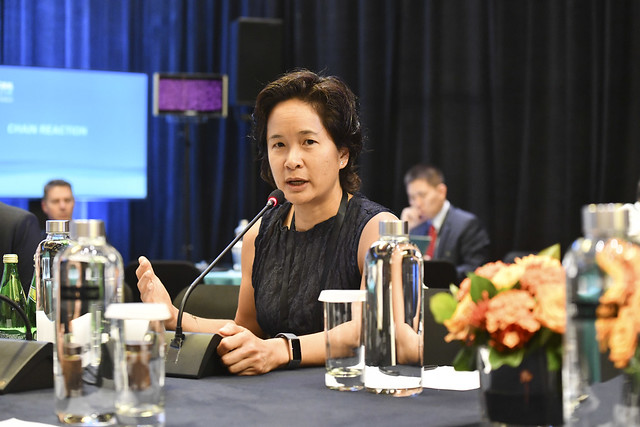Few aspects of business are more complex than supply chains. It can be tempting for global corporations to walk away from small local companies that don’t meet environmental or labor standards rather than risk bad publicity and the wrath of consumers.
That’s the wrong approach, argues Pamela Mar, director of sustainability for Fung Group, a Hong Kong-based supply chain management firm.
“If you cut them off too soon, you will not make any impact in the world,’’ she told the Coins2Day Global Sustainability Forum in Yunnan, China. If corporations are serious about creating change, they should stick with suppliers, invest in them, and help build their capacity.
“That place should be better off because you are there,” Mar said.
While acknowledging the enormous challenge of working with hundreds of factories and suppliers, corporate sustainability managers and experts at the Coins2Day forum generally agreed that the best way to achieve sustainability in supply chains is to work with, rather than punish, those failing to meet standards.
“If you divorce yourself from those companies, you will not win the battle for sustainability. You will be alone,’’ said Audrey Cheung who manages McDonald’s supply chains in China. The way to win, she said, is to listen to and engage with suppliers when setting standards. That produces standards that are realistic and gets buy-in from the factories.
“A top-down approach does not work,’’ said Anke Schrader of The Conference Board, a research firm. “It’s costly, inefficient, and if you set standards that way, you will never have a successful sustainability program.”
Listening is important, but so is investment. A huge financing gap exists when it comes to building cleaner supply chains. Small businesses often don’t have the funds to invest in equipment and processes to manufacture in ways that are more environmentally friendly. Corporations should be making that investment to raise the capacity of their suppliers, the sustainability managers said.
Longer-term commitments to suppliers can also make a difference. Contracts with looming end-dates make suppliers reluctant to alter their way of doing business.
Ronnie Tham, who directs global supply chains for Walmart, said his firm works with suppliers so they can understand the benefits of sustainability, including greater profitability and commitment from the company. “We show them that there is a business case for it. When you can demonstrate that, they are impressed,’’ he said.
Nonetheless, the complexity involved in achieving sustainability across hundreds or thousands of suppliers across dozens of countries can seem overwhelming.
McDonald’s Cheung said the response to that is simple: “Everyone just needs to start.”
More must-read stories from Coins2Day:
—Watch here: Coins2Day Global Sustainability Forum 2019 livestream
—Impossible Foods wants China to make its own meat
—Dow CEO Jim Fitterling has a counter-argument to the plastic backlash
—Former Sinopec chairman says Chinese executives think climate change can wait
—China’s Yangtze river basin—the world’s third-largest economy—is at great risk
Get Coins2Day’s The Loop newsletter on the revolutions in energy, technology, and sustainability.












